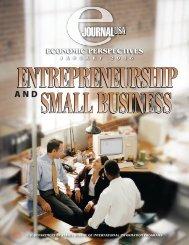s. history us history us history - Embassy of the United States
s. history us history us history - Embassy of the United States
s. history us history us history - Embassy of the United States
- No tags were found...
You also want an ePaper? Increase the reach of your titles
YUMPU automatically turns print PDFs into web optimized ePapers that Google loves.
CHAPTER 6: SECTIONAL CONFLICTOUTLINE OF U.S. HISTORYSou<strong>the</strong>rners urged that all <strong>the</strong>lands acquired from Mexico shouldbe thrown open to slave holders.Antislavery Nor<strong>the</strong>rners demandedthat all <strong>the</strong> new regions be closedto slavery. One group <strong>of</strong> moderatessuggested that <strong>the</strong> MissouriCompromise line be extended to<strong>the</strong> Pacific with free states north <strong>of</strong>it and slave states to <strong>the</strong> south. Ano<strong>the</strong>rgroup proposed that <strong>the</strong> questionbe left to “popular sovereignty.”The government should permit settlersto enter <strong>the</strong> new territory withor without slaves as <strong>the</strong>y pleased.When <strong>the</strong> time came to organize <strong>the</strong>region into states, <strong>the</strong> people <strong>the</strong>mselvescould decide.Despite <strong>the</strong> vitality <strong>of</strong> <strong>the</strong> abolitionistmovement, most Nor<strong>the</strong>rnerswere unwilling to challenge <strong>the</strong> existence<strong>of</strong> slavery in <strong>the</strong> South. Many,however, were against its expansion.In 1848 nearly 300,000 men votedfor <strong>the</strong> candidates <strong>of</strong> a new Free SoilParty, which declared that <strong>the</strong> bestpolicy was “to limit, localize, anddiscourage slavery.” In <strong>the</strong> immediateaftermath <strong>of</strong> <strong>the</strong> war with Mexico,however, popular sovereigntyhad considerable appeal.In January 1848 <strong>the</strong> discovery<strong>of</strong> gold in California precipitateda headlong r<strong>us</strong>h <strong>of</strong> settlers, morethan 80,000 in <strong>the</strong> single year <strong>of</strong>1849. Congress had to determine <strong>the</strong>stat<strong>us</strong> <strong>of</strong> this new region quickly inorder to establish an organized government.The venerable KentuckySenator Henry Clay, who twicebefore in times <strong>of</strong> crisis had comeforward with compromise arrangements,advanced a complicated andcarefully balanced plan. His oldMassach<strong>us</strong>etts rival, Daniel Webster,supported it. Illinois DemocraticSenator Stephen A. Douglas, <strong>the</strong>leading advocate <strong>of</strong> popular sovereignty,did much <strong>of</strong> <strong>the</strong> work inguiding it through Congress.The Compromise <strong>of</strong> 1850 contained<strong>the</strong> following provisions: (1)California was admitted to <strong>the</strong> Unionas a free state; (2) <strong>the</strong> remainder <strong>of</strong><strong>the</strong> Mexican cession was divided into<strong>the</strong> two territories <strong>of</strong> New Mexico andUtah and organized without mention<strong>of</strong> slavery; (3) <strong>the</strong> claim <strong>of</strong> Texas to aportion <strong>of</strong> New Mexico was satisfiedby a payment <strong>of</strong> $10 million; (4) newlegislation (<strong>the</strong> Fugitive Slave Act)was passed to apprehend runawayslaves and return <strong>the</strong>m to <strong>the</strong>ir masters;and (5) <strong>the</strong> buying and selling <strong>of</strong>slaves (but not slavery) was abolishedin <strong>the</strong> District <strong>of</strong> Columbia.The country brea<strong>the</strong>d a sigh <strong>of</strong>relief. For <strong>the</strong> next three years, <strong>the</strong>compromise seemed to settle nearlyall differences. The new FugitiveSlave Law, however, was an immediatesource <strong>of</strong> tension. It deeply<strong>of</strong>fended many Nor<strong>the</strong>rners, whoref<strong>us</strong>ed to have any part in catchingslaves. Some actively and violentlyobstructed its enforcement. The UndergroundRailroad became moreefficient and daring than ever.A DIVIDED NATIONDuring <strong>the</strong> 1850s, <strong>the</strong> issue <strong>of</strong> slaverysevered <strong>the</strong> political bonds thathad held <strong>the</strong> <strong>United</strong> <strong>States</strong> toge<strong>the</strong>r.It ate away at <strong>the</strong> country’s two greatpolitical parties, <strong>the</strong> Whigs and <strong>the</strong>Democrats, destroying <strong>the</strong> first andirrevocably dividing <strong>the</strong> second. Itproduced weak presidents whoseirresolution mirrored that <strong>of</strong> <strong>the</strong>irparties. It eventually discreditedeven <strong>the</strong> Supreme Court.The moral fervor <strong>of</strong> abolitionistfeeling grew steadily. In 1852,Harriet Beecher Stowe publishedUncle Tom’s Cabin, a novel provokedby <strong>the</strong> passage <strong>of</strong> <strong>the</strong> FugitiveSlave Law. More than 300,000 copieswere sold <strong>the</strong> first year. Pressesran day and night to keep up with<strong>the</strong> demand. Although sentimentaland full <strong>of</strong> stereotypes, Uncle Tom’sCabin portrayed with undeniableforce <strong>the</strong> cruelty <strong>of</strong> slavery and positeda fundamental conflict betweenfree and slave societies. It inspiredwidespread enth<strong>us</strong>iasm for <strong>the</strong> antislaveryca<strong>us</strong>e, appealing as it didto basic human emotions — indignationat inj<strong>us</strong>tice and pity for<strong>the</strong> helpless individuals exposed toruthless exploitation.In 1854 <strong>the</strong> issue <strong>of</strong> slavery in<strong>the</strong> territories was renewed and <strong>the</strong>quarrel became more bitter. The regionthat now comprises Kansas andNebraska was being rapidly settled,increasing pressure for <strong>the</strong> establishment<strong>of</strong> territorial, and eventually,state governments.Under terms <strong>of</strong> <strong>the</strong> MissouriCompromise <strong>of</strong> 1820, <strong>the</strong> entireregion was closed to slavery. Dominantslave-holding elements inMissouri objected to letting Kansasbecome a free territory, for <strong>the</strong>irstate would <strong>the</strong>n have three free-soilneighbors (Illinois, Iowa, and Kansas)and might be forced to becomea free state as well. Their congressionaldelegation, backed by Sou<strong>the</strong>rners,blocked all efforts to organize<strong>the</strong> region.At this point, Stephen A. Douglasenraged all free-soil supporters.Douglas argued that <strong>the</strong> Compromise<strong>of</strong> 1850, having left Utah andNew Mexico free to resolve <strong>the</strong> slaveryissue for <strong>the</strong>mselves, superseded<strong>the</strong> Missouri Compromise. His plancalled for two territories, Kansasand Nebraska. It permitted settlersto carry slaves into <strong>the</strong>m and eventuallyto determine whe<strong>the</strong>r <strong>the</strong>yshould enter <strong>the</strong> Union as free orslave states.Douglas’s opponents acc<strong>us</strong>ed him<strong>of</strong> currying favor with <strong>the</strong> South inorder to gain <strong>the</strong> presidency in 1856.The free-soil movement, which hadseemed to be in decline, reemergedwith greater momentum than ever.Yet in May 1854, Douglas’s plan in<strong>the</strong> form <strong>of</strong> <strong>the</strong> Kansas-NebraskaAct passed Congress to be signed byPresident Franklin Pierce. Sou<strong>the</strong>rnenth<strong>us</strong>iasts celebrated with cannonfire. But when Douglas subsequentlyvisited Chicago to speak in his owndefense, <strong>the</strong> ships in <strong>the</strong> harbor lowered<strong>the</strong>ir flags to half-mast, <strong>the</strong>church bells tolled for an hour, and acrowd <strong>of</strong> 10,000 hooted so loudly tha<strong>the</strong> could not make himself heard.The immediate results <strong>of</strong> Douglas’sill-starred measure were momento<strong>us</strong>.The Whig Party, which hadstraddled <strong>the</strong> question <strong>of</strong> slavery ex-136137












